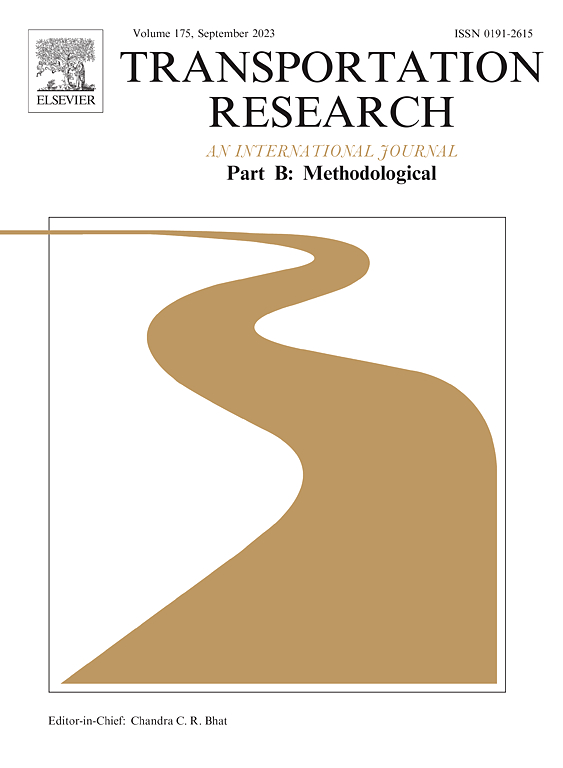Impacts of a sustainable aviation fuel mandate on airline competition — Full-service carrier vs. low-cost carrier
IF 6.3
1区 工程技术
Q1 ECONOMICS
引用次数: 0
Abstract
The aviation industry has proposed the collective goal of achieving net-zero carbon emissions by 2050. In addition to the existing market-based methods (MBMs), the use of renewable energies, in particular, sustainable aviation fuel (SAF), could be one of the most promising means for achieving this long-term target. This paper investigates how an SAF mandate from the government can lead to heterogeneous impacts on two types of airlines, namely, full-service carriers (FSCs) and low-cost carriers (LCCs), that compete in the same markets. A game-theoretic economic model is constructed that accounts for the different service quality levels and cost structures (i.e., fuel efficiency) between FSCs and LCCs. Our analytical results suggest that the SAF mandate favors LCCs over FSCs. The share of SAF blended into fuel raises the airfares of both types of airlines while reducing the traffic and profit of FSCs. The impacts on the LCC traffic and profit depend on its fuel efficiency relative to that of FSC. When LCCs are sufficiently fuel efficient, the SAF mandate can increase their traffic and profit. The government subsidy on airline's SAF use is also analyzed, deriving the optimal subsidy levels for FSC and LCC respectively to achieve pareto-improvement in social welfare and consumer surplus. We also examine how air passengers’ environmental awareness affects the outcomes of SAF mandate implementation. Our economic model also accounts for passengers’ heterogeneous preferences in terms of service quality and price sensitivity.
可持续航空燃料规定对航空公司竞争的影响 - 全服务航空公司与低成本航空公司的比较
航空业提出了到 2050 年实现碳净零排放的集体目标。除了现有的基于市场的方法(MBMs)外,使用可再生能源,特别是可持续航空燃料(SAF),可能是实现这一长期目标的最有前途的方法之一。本文研究了政府强制使用可持续航空燃料如何对在同一市场上竞争的两类航空公司(即全服务航空公司(FSC)和低成本航空公司(LCC))产生不同的影响。我们构建了一个博弈论经济模型,该模型考虑了全服务航空公司和低成本航空公司之间不同的服务质量水平和成本结构(即燃油效率)。我们的分析结果表明,SAF 强制性规定有利于低地乘客运输公司,而不利于固定客运公司。掺入燃料中的 SAF 比例提高了两类航空公司的机票价格,同时减少了 FSC 的运输量和利润。对低成本航空公司运输量和利润的影响取决于其相对于固定航班服务公司的燃油效率。当低成本航空公司的燃油效率足够高时,SAF 规定可增加其运输量和利润。我们还分析了政府对航空公司使用 SAF 的补贴,分别得出了对 FSC 和 LCC 的最佳补贴水平,以实现社会福利和消费者剩余的帕累托改进。我们还研究了航空乘客的环保意识如何影响 SAF 强制实施的结果。我们的经济模型还考虑了乘客在服务质量和价格敏感性方面的异质性偏好。
本文章由计算机程序翻译,如有差异,请以英文原文为准。
求助全文
约1分钟内获得全文
求助全文
来源期刊
CiteScore
12.40
自引率
8.80%
发文量
143
审稿时长
14.1 weeks
期刊介绍:
Transportation Research: Part B publishes papers on all methodological aspects of the subject, particularly those that require mathematical analysis. The general theme of the journal is the development and solution of problems that are adequately motivated to deal with important aspects of the design and/or analysis of transportation systems. Areas covered include: traffic flow; design and analysis of transportation networks; control and scheduling; optimization; queuing theory; logistics; supply chains; development and application of statistical, econometric and mathematical models to address transportation problems; cost models; pricing and/or investment; traveler or shipper behavior; cost-benefit methodologies.

 求助内容:
求助内容: 应助结果提醒方式:
应助结果提醒方式:


